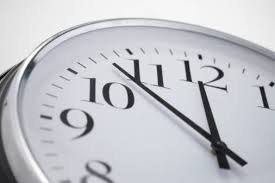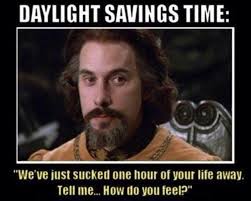So it’s my understanding that the purpose of Daylight Savings Time (according to our friend Benjamin Franklin) was mainly to make better use of the daylight hours. I’m not entirely sure what was happening in the world at that time that made folks think that we weren’t using our daytime well enough but whatever the case, DST was instilled. I have a good feeling that the powers that were able to make this change happen were unaware of the negative effects on our minds and bodies it would bring on.

There are more studies and articles coming out each year that are tracking the effects of the loss of one hour, 60 minutes or 3600 seconds every Spring. Some studies show that the number of heart attacks increase specifically the week after the time change. Some show the number of vehicle and work-place (specifically major) accidents and even suicides increasing that same week. Regardless of whether or not you think we should just stay on Daylight Savings Time or not, I think it is important for us to understand, and of course then apply, how our bodies were designed to function in relation to light and our natural circadian rhythm.
Circadian rhythms (CR) are physical, mental and behavioral changes that follow a roughly 24-hour cycle, responding primarily to light and darkness in an organism’s environment. CRs are produced by natural factors within the body, but they are also affected by signals in the environment. Light is the main cue influencing circadian rhythms, turning on or turning off genes (which is called genetic expression) that control an organism’s internal clocks. CRs can influence sleep-wake cycles, hormone production and release, body temperature and other important functions. They have been linked to various sleep disorders, such as insomnia and abnormal circadian rhythms have also been associated with obesity, diabetes, depression, bipolar disorder and seasonal affective disorder.
In my practice I come across a number of people who are very disconnected from their ideal circadian rhythm. They have not supported or followed their natural CR for so many years that they now identify themselves as a “night owl” and believe that is normal. Being a night owl is not normal for a healthy circadian rhythm. And in my professional opinion, not having a healthy circadian rhythm is an invitation for all kinds of diseases both chronic and acute. This is a forced or learned response that your body has developed for one of many reasons.
Our sleep-wake cycle is designed quite simply and effectively. We are supposed to get up with the sun and not an alarm clock. When was the last time you did that on purpose on a weekday morning?! So after waking at approximately 4AM-6AM, our bodies are designed to get moving, go work for the day and feel your best and most energetic in the morning and early afternoon. Later afternoon you should begin to taper down and start to lose a little of that awesome AM energy. By 6 PM you should be winding down from the day and be in bed by 10 or 10:30 PM at the latest. From 10PM – 2 AM your body undergoes more physical repair and from 2 AM – 6 AM your mental repair is fully at work. Ever notice that you feel worse during the day if you wake up an hour before your alarm clock goes off than if you woke up shortly after retiring for bed? Your mind needs that critical window of time to regroup and repair especially if you demand a lot from it. If you have a mentally draining job you should dedicate your sleep time accordingly in order to allow for the best rest in order to perform well.
A very important sleep fact to note is that it is much more important to go to bed and wake up at the same time each day vs. focusing on how much sleep you are getting each night. Let’s say your sleep cycle is 10-6. If you can’t get to bed until midnight one night due to a late night at work or socializing with friends, still wake up at 6 AM the following day. Don’t sleep until 8 AM to get your usual eight hours. If you sleep in, you will throw off your cycle more which will lead to more challenges. This is often why people end up becoming night owls as I mentioned earlier. This is very much related to something called adrenal fatigue.
You see, cortisol (which is a hormone produced by your adrenal glands) levels normally fluctuate throughout the day and night in a circadian rhythm that peaks at about 8 AM and reaches it lowest around 4 AM. While it is vital to health for the adrenals to secret more cortisol in response to stress (fight or flight type of stress), it is also very important that bodily functions and cortisol levels return to normal following a stressful event. Unfortunately, in our current high-stress culture, the stress response is activated so often that the body does not always have a chance to return to normal. In addition, we often don’t make the time to recover from these events. Remember, your adrenals don’t know whether or not you were just being chased by a lion or you just had a crazy deadline to meet at work. All they know is that your brain told them you were super stressed and you needed more juice. The above can lead to health problems resulting from too much circulating cortisol (which is often a contributor to difficulty losing weight or a catalyst to gaining weight). This could also come from too little cortisol if the adrenal glands become chronically fatigued (adrenal fatigue).
Your sleep pattern is a good predictor of what is going on in your body as it relates to your hormone patterns. If your cortisol level is not high enough during the day, you will not have normal melatonin production at night. Melatonin is a hormone so many people will resort to taking a melatonin supplement vs. dealing with the cause of the actual hormone imbalance. Unfortunately just be taking the melatonin does not fix the cause of the cortisol being out of balance in the first place that caused the melatonin to not be produced normally. CAUSE & EFFECT friends!!! Melatonin supplementation is best used for time zone changes as it is a hormone so we don’t want to use it very liberally as I know a lot of folks do. The first and most important thing to do to help balance the cortisol and melatonin are to REDUCE STRESSORS 🙂
On a side note, caffeine can be a stressor as caffeine artificially stimulates your cortisol levels. This can contribute to adrenal fatigue over time so it is advised to reduce (or as I would advise) to eliminate caffeine if you have or think you have adrenal fatigue.
So in summary, health and hormones are enormously related. Light and hormones and health are even more related! We discuss this in detail if you have ever gone through my Metabolic Typing program through Fitness Elements. If we focused more on hormone health alone we would live in a much healthier country. At some point, you have to ask yourself if you are earning the privilege to criticize your game. Meaning, are you doing the things you should be doing across the board to expect to have good health, energy, healthy weight, etc. Most of us expect it but shouldn’t be. Be different friends, live different, live healthy by focusing on your whole health.

